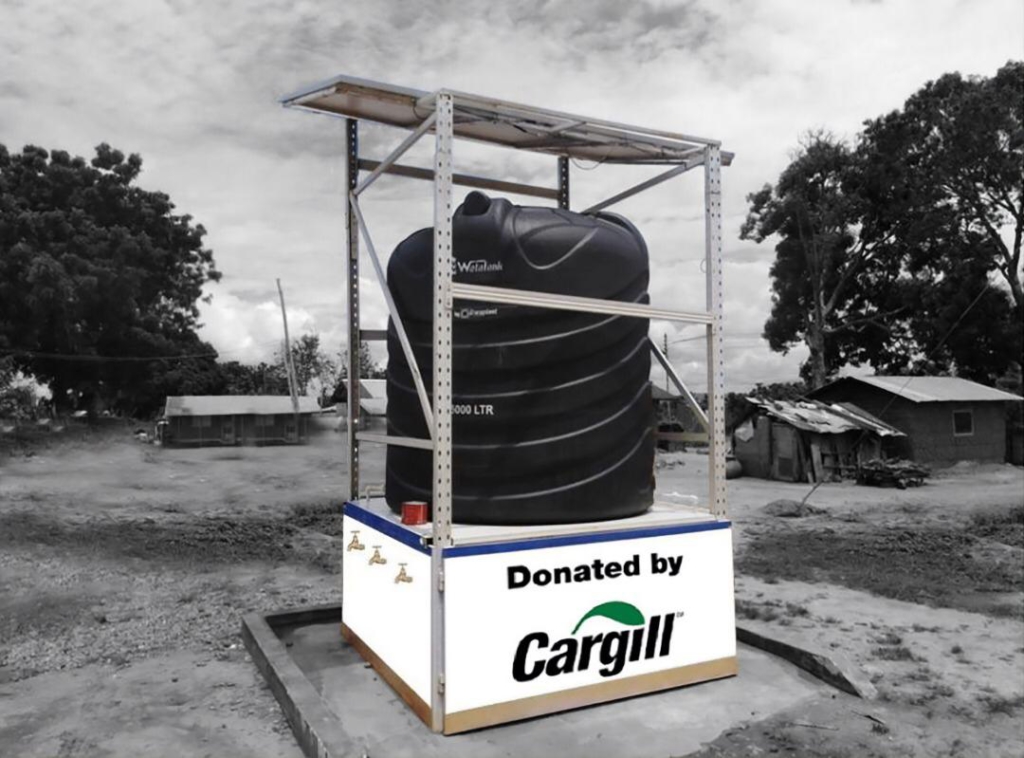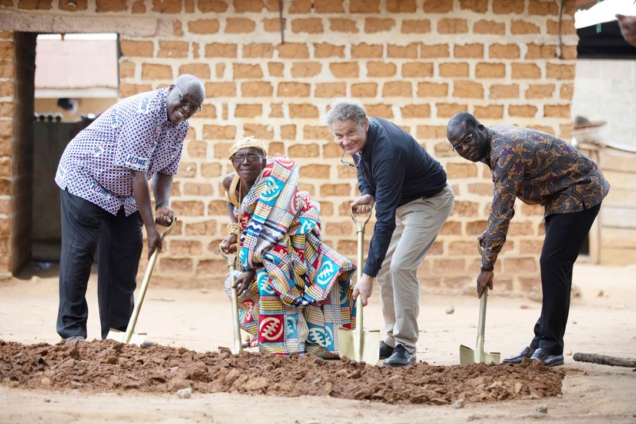Cargill Ghana Limited has cut the sod for the construction of ten mechanised solar water systems in partnership with Safe Water Network Gh.
The event took place at M.A. JHS Park, Abrabra, in the Sefwi Wiawso Municipality of the Western North Region.
The sustainability partnership project, dubbed Expanding sustainable access to safe water in cocoa-growing communities in Ghana, aims at enhancing access to safe water in cocoa rural farming communities.
This joint project with Safe Water Network Gh is in line with Cargill's Community Wellbeing Strategic Action Plan linked to the United Nations' Sustainable Development Goal (SDG) 6 of providing safe and affordable water for all by 2030.
Ten rural cocoa-growing communities namely; Kramokrom, Punikrom, Ntrentreso, Surano, Baakokrom, Kantankrobo, Asafo, Abrabra, Nambro and Afamu in the Western North region, will have access to a mechanised micro-water system operated with solar energy.
The aforementioned areas have been part of Cargill's sourcing network and the Cargill Cocoa Promise since 2017.
The selection of the communities and the projects were based on a Community Action Plan (CAP) development and a needs assessment in collaboration with CARE International. In all, a total of 6,000 people, in 10 communities and 4 cocoa growing districts are expected to benefit from the water project.

“Cargill is committed to using the power of partnership to bring transformation in the lives of our cherished cocoa farmers and their communities.
"This project is a necessity as it will contribute to improving the livelihood of the farmers and subsequently keep the cocoa sector alive,'' comments Samuel Apana, the Sustainability Country Lead of Cargill.
Safe Water Network Gh. (SWN), a globally recognized decentralized safe water provider, has been tasked with the procurement of equipment for the installation of the 10 new micro-water systems powered by solar energy in the region.
The organization would improve access to clean water for these 10 communities across four cocoa districts by using mechanized water treatment technology, a standalone water tank with 5,000 litres storage capacity with six taps and sourced from one borehole which is equipped with solar power with four panels.
The initiative will also provide training for community members as well as follow-up support for the primary objectives to be satisfied.
The solar water systems will be owned by local District Assemblies and will be operated and maintained by locally trained community Water & Sanitation Management Teams (WMSTs) and Operators.
In principle, the installed systems' ongoing efficiency and clean water provision would be the responsibility of the local WSMTs and Operators. The WSMTs will be able to cover the operational, repair, and other support costs of the water system with proceeds from water sales.
“We are excited about our partnership with Cargill which is not only providing new safe water infrastructure but investing in developing local level operating skill capability to keep it going in the long term,” said Safe Water Network Country Director, Charles Nimako.
The installation of all 10 mechanized micro-water systems in the 10 communities of the four cocoa districts in the Western North Region is expected to be completed in six months. The total estimated cost of this Cargill initiative is $150,000 which is approximately ¢864,750.
This new initiative typifies the commitment of the “Cargill Cocoa Promise” aimed at ensuring a thriving and sustainable cocoa sector for the unborn generation by improving the livelihood of farmers and communities holistically in origin countries.
Founded in 2012, the Corporate Social Responsibility scheme has leveraged the company's 10 years of experience in the field with farmers and farmer organizations to achieve multiple ambitions and objectives that have been in line with the United Nations' Sustainable Development Goals (SDGs) since 2017.
It is made possible by working together with a vast network of partner organizations and stakeholders.
Present at the sod-cutting ceremony was the Chief of Abrabra, Nana Yaw Korankye, Regional CHED Manager, COCOBOD, Kwame Owusu Ansah, the Managing Director of Cargill Ghana Ltd, Mr Aedo van der Weij, MCE for Sefwi Wiawso Municipal Assembly, Honourable Louis Owusu Agyapong, Country Director of Safe Water Network Gh., Charles Nimako, Hon. John Enning, Assemblyman, Abrabra, and the chiefs from the ten rural cocoa-growing communities.
At the ceremony, Cargill Ghana also highlighted the fact that its Licensed Buying Company (LBC), Cargill Kokoo Sourcing Ltd. (CKSL), only buys directly from farmers using latest technology to ensure full traceability of the cocoa from the farm gate to the customer (Cargill CocoaWise)
Latest Stories
-
Vasseur questions ‘strange momentum’ of Formula One race director change
12 mins -
“I am disappointed in Kojo Manuel” – Merqury Quaye on “no tie” comment
12 mins -
Nana Kwame Bediako; The beacon of unity
14 mins -
Western Region: NDC youth wing embarks on phase 2 of ‘retail campaign’
40 mins -
Action Chapel International holds annual Impact Convention in November
41 mins -
Jana Foundation urges young women to take up leadership roles
46 mins -
All set for Joy FM Prayer Summit for Peace 2024
57 mins -
Managing Prediabetes with the Help of a Dietitian
1 hour -
Joy FM listeners criticise Achiase Commanding Officer’s election comment
2 hours -
Legal Aid Commission employees threaten strike over poor working conditions
2 hours -
Ghana ranked 7th globally as biggest beneficiary of World Bank funding
2 hours -
IMF board to disburse $360m to Ghana in December after third review
2 hours -
Former Bono Regional NPP organiser donates 13 motorbikes to 12 constituencies
2 hours -
Securities industry: Assets under management estimated at GH¢81.7bn in quarter 3, 2024
2 hours -
Gold Fields Ghana Foundation challenges graduates to maximise benefits of community apprenticeship programme
4 hours

